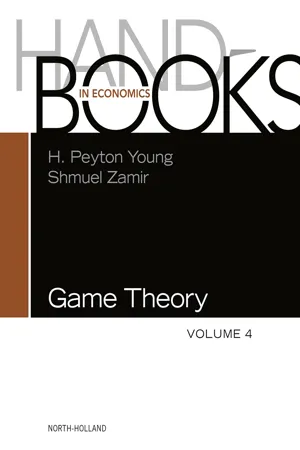
- 1,024 pages
- English
- ePUB (mobile friendly)
- Available on iOS & Android
Handbook of Game Theory
About this book
The ability to understand and predict behavior in strategic situations, in which an individual's success in making choices depends on the choices of others, has been the domain of game theory since the 1950s. Developing the theories at the heart of game theory has resulted in 8 Nobel Prizes and insights that researchers in many fields continue to develop. In Volume 4, top scholars synthesize and analyze mainstream scholarship on games and economic behavior, providing an updated account of developments in game theory since the 2002 publication of Volume 3, which only covers work through the mid 1990s.- Focuses on innovation in games and economic behavior- Presents coherent summaries of subjects in game theory- Makes details about game theory accessible to scholars in fields outside economics
Frequently asked questions
- Essential is ideal for learners and professionals who enjoy exploring a wide range of subjects. Access the Essential Library with 800,000+ trusted titles and best-sellers across business, personal growth, and the humanities. Includes unlimited reading time and Standard Read Aloud voice.
- Complete: Perfect for advanced learners and researchers needing full, unrestricted access. Unlock 1.4M+ books across hundreds of subjects, including academic and specialized titles. The Complete Plan also includes advanced features like Premium Read Aloud and Research Assistant.
Please note we cannot support devices running on iOS 13 and Android 7 or earlier. Learn more about using the app.
Information
Table of contents
- Cover image
- Title page
- Table of Contents
- Copyright
- Contributors
- Preface
- Introduction to the Series
- Chapter 1: Rationality
- Chapter 2: Advances in Zero-Sum Dynamic Games
- Chapter 3: Games on Networks
- Chapter 4: Reputations in Repeated Games
- Chapter 5: Coalition Formation
- Chapter 6: Stochastic Evolutionary Game Dynamics
- Chapter 7: Advances in Auctions
- Chapter 8: Combinatorial Auctions
- Chapter 9: Algorithmic Mechanism Design: Through the lens of Multiunit auctions
- Chapter 10: Behavioral Game Theory Experiments and Modeling
- Chapter 11: Evolutionary Game Theory in Biology
- Chapter 12: Epistemic Game Theory
- Chapter 13: Population Games and Deterministic Evolutionary Dynamics
- Chapter 14: The Complexity of Computing Equilibria
- Chapter 15: Theory of Combinatorial Games
- Chapter 16: Game Theory and Distributed Control
- Chapter 17: Ambiguity and Nonexpected Utility
- Chapter 18: Calibration and Expert Testing
- Index